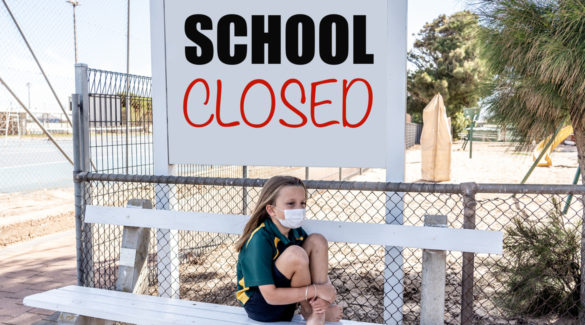President Joe Biden’s executive order placing a halt on new natural gas and oil leases on public lands is leaving Western states concerned about how the ban will affect their budgets.
Tax revenue from oil and gas leases on federal lands in Western states partially funds a myriad of state and local services, for example, oil and gas revenues fund health care services, infrastructure construction and repair, police and fire departments, and public education.
Because of the location of most of these lease areas, rural districts will be especially affected by Biden’s moratorium.
Study Details States Economic Losses
A recently-released study from the University of Wyoming (UW), commissioned by the Wyoming Energy Authority and the New Mexico Oil and Gas Association (NMOGA), details how a federal oil and gas leasing moratorium could cause significant fiscal and economic losses in eight Western states. According to the study, Wyoming would stand to lose $230 million in tax revenue due to the moratorium in 2021 alone, and about $30 billion cumulatively through 2040.
“A federal leasing ban would be a serious threat to our state’s economy,” said Wyoming Governor Mark Gordon, in a press release citing the UW study. “The revenue challenges that we currently face would be further exacerbated by any misguided federal policies that unfairly target states with large swaths of federal land.”
Outsized Impact on Education
Education budgets will be especially hard hit by a federal oil and gas leasing ban, said Jillian Balow, Wyoming State Superintendent of Public Instruction, in a statement released after Biden placed a moratorium on new federal oil and gas leases.
“On the heels of the worst economic year we’ve all experienced in modern history, it is unconscionable that Acting Interior Secretary [Scott] de la Vega would now do this to our kids,” said Balow. “I plan to call my counterparts in these most affected states of New Mexico, Colorado, Utah, North Dakota, Montana, California, and Alaska to discuss advocacy with the Acting Secretary and anticipated Interior Secretary to end the moratorium.”
New Mexico, the state in the lower 48 states with the most federal land examined by the study, would be the hardest hit by a ban on new oil and gas leases. The study calculates New Mexico could lose up to $808 million in tax revenue this year, and around $58 billion cumulatively through 2040.
‘Vital Funding’
Biden’s oil and gas ban will harm New Mexico’s school children, said Jessica Sanders, president of the New Mexico Science Teachers Association and the state’s Teacher of the Year in 2019, in a media conference call.
“Oil and gas in New Mexico fund $1.37 billion for education,” said Sanders. “That money funds teacher jobs, curriculum, and everything related to education in my state.
“New Mexico’s children are the future, and without vital funding from New Mexico’s oil and gas industry our students will not have access to the tools and resources they need to enter the workforce,” Sanders said.
It is “impossible” to separate the fate of New Mexico’s economy and its education system from oil and gas production on federal lands, said NMOGA President Ryan Flynn in a statement released to coincide with the release of the UW study.
“Our state depends on oil and gas to fund schools, put teachers in classrooms and help our young children learn,” said Flynn. “With vast stretches of federal land, it is simply impossible to divorce our economic success from land management policy in western states like New Mexico, and funding for education, access to healthcare, and new infrastructure projects are all on the line.
“We are committed to doing our part to reduce emissions and protect the environment, but we cannot slap thousands of New Mexicans with proposals that destroy jobs and ravage communities,” Flynn said.
According to the UW study, the cumulative tax revenue losses through 2040 for the other states examined will top $40 billion for Alaska, $3 billion for California, $6 billion for Colorado, $2.8 billion for Montana, $7.2 billion for North Dakota, and $2.8 billion for Utah.
Tim Benson (tbenson@heartland.org) is a policy analyst at The Heartland Institute.
